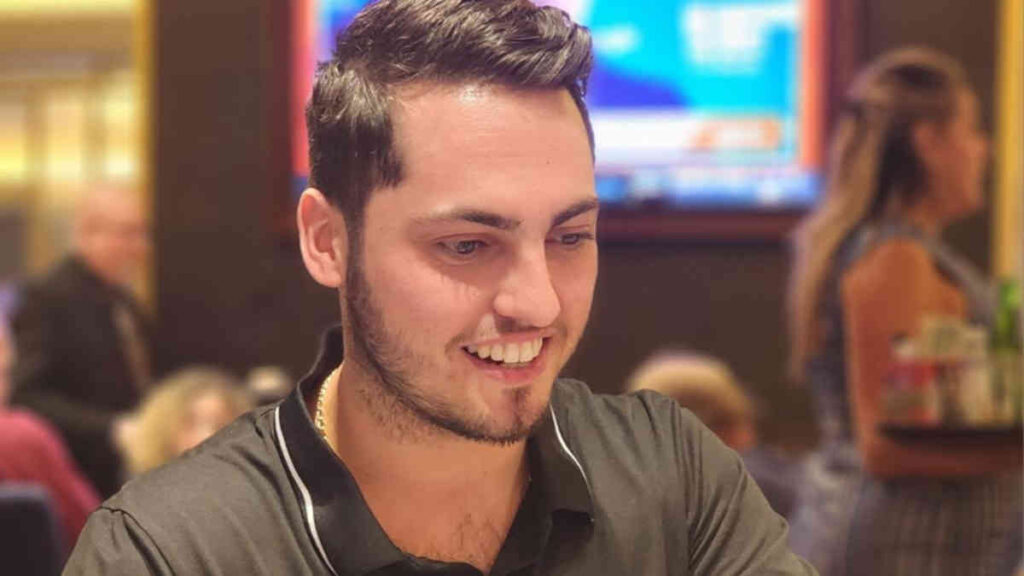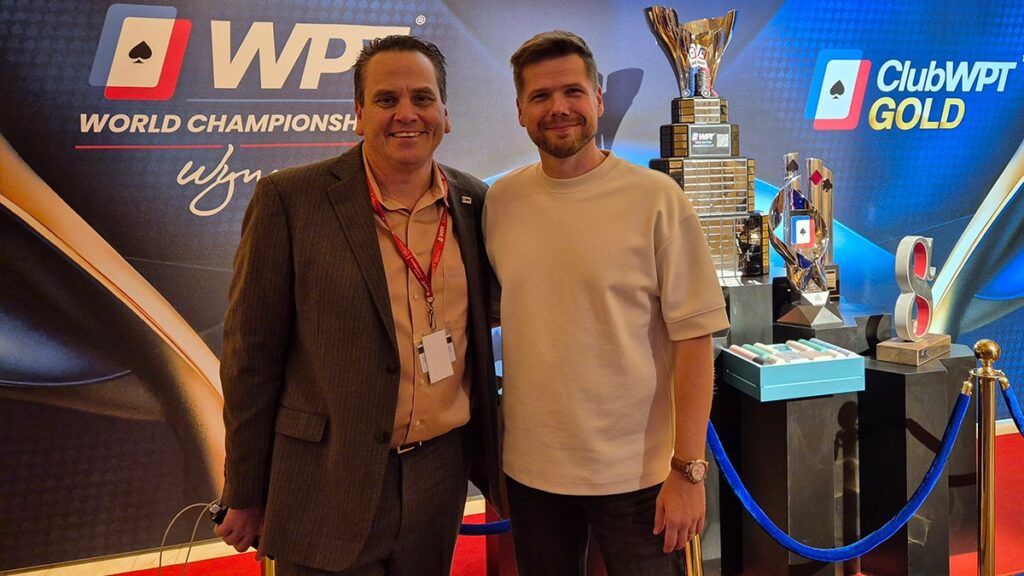I met Hugo Silva for the first time at a Lexy Gavin-Mather and Joey Ingram meet-up game at the Venetian this summer. He was sitting to my immediate left and was a maniac, raising the stakes in a $1/$3 game all the way up to $200, seemingly no matter his position or his cards.
He had a chaotic, fun energy about him that you couldn’t help but pay attention to. I was immediately hooked, so I wanted to ask him for an interview.
Hugo’s poker journey is the stuff of late-night cardroom legends: reckless beginnings, hard-earned lessons, and an unshakeable love for the game. Today, at 30 years old, Hugo sits comfortably among Vegas’s rising stars, known not just for his skill but also for the infectious energy he brings to every table.
I remember looking at the $5/$5/$10 rock game and feeling so intimidated, Hugo recalls. Back when I was grinding $1/$2, I just knew — one day, I’m going to be in that game.
It didn’t happen overnight. Hugo’s early years were marked by chaotic bankroll swings.
When I was younger, I was reckless. I once went to Aria with $6,000 and left down $13,800. I was offering Zelle, Venmo, really anything to stay in the game,” he laughs. At the end of the night, walking back to my hotel, I thought, did I really torch that money? Was that a dream?
But what stands out isn’t the loss — it’s how he took it. “Tonight, for example, I played great, but I got horribly unlucky. I lost so graciously. I didn’t tilt or spazz out. I’ve grown.”
That mental growth is what transformed Hugo from a degenerate gambler into a professional.
Hooked Since Age 8
Born in Brazil, Hugo moved to the United States with his parents who worked tirelessly. They worked as a dishwasher (father) and housecleaner (mother) for 20 years in order to give Hugo all the opportunities they could, including putting him through college.
His love for poker was sparked at a young age:
I was eight years old in 2003, sitting at home watching ESPN. Suddenly, this new game comes on — poker. There was Phil Ivey in a Rockets jersey, Phil Hellmuth with his bracelets, Annie Duke, and Jennifer Harman. These poker characters made poker magical back then.
By his teens, Hugo was playing $5 tournaments with friends, chasing the sunrise after marathon sit-and-go’s to win $30. The group chat from those days, still called Poker Zinho (translated as “a little poker”), lives on — even though everyone else in his old crew have left the game behind.
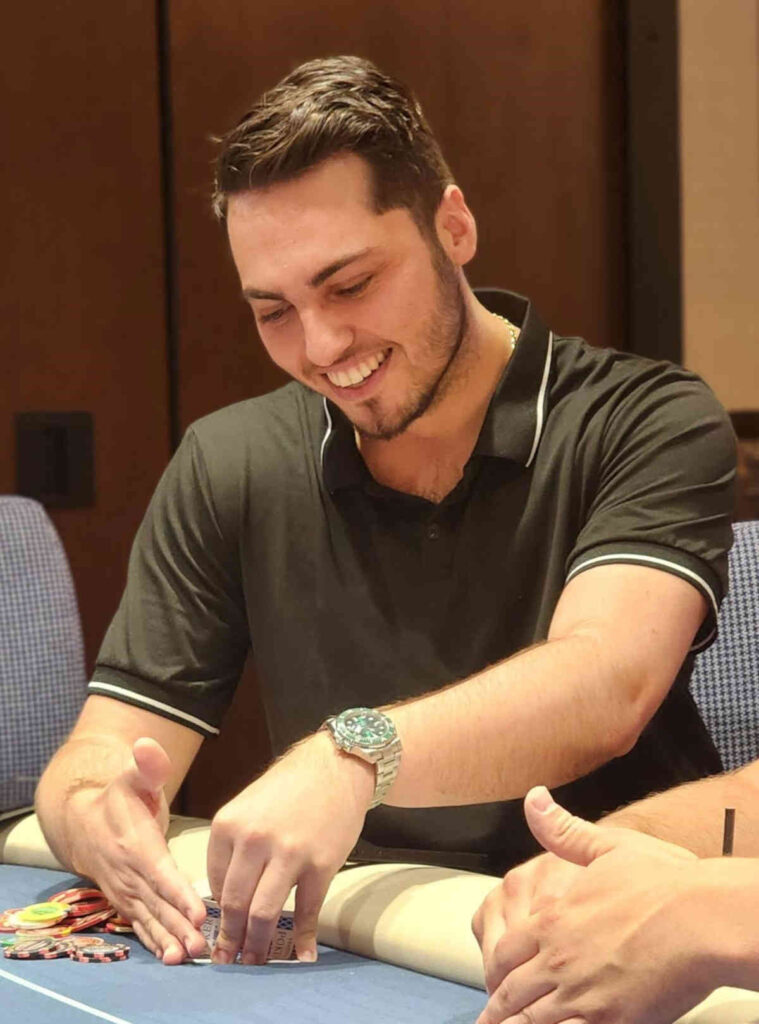
Lessons in Losing
Hugo’s early twenties were a crash course in what not to do: blasting off his paycheck, torching sports bets, and blowing winnings as fast as he earned them.
I was a real degenerate, Hugo admits. But I’m grateful I went through that. It taught me what not to do.
The turning point came during COVID. “The most beautiful thing happened — COVID. I deposited $100 into PokerBros, and I never looked back.”
Hugo credits the book Poker Winners Are Different by Dr. Alan N. Schoonmaker – which he’d had for years but never read – for changing his mental game. Michael Loncar suggested he read it, but Hugo held onto it for three years without touching it, to his immense regret.
I realized poker is a negative sum game. Only 7-8% of players are winners over the course of a year. It’s tough. You need discipline, bankroll management, and emotional control. That’s what I was lacking in my youth.
From 180 Dollar Bullets to a Six-Figure Bankroll
In San Diego, Hugo built his roll grinding $1/$3, taking $180 shots with a disciplined approach. As his bankroll grew, he cautiously moved up to $2/$5.
I never wanted to go back to being broke. If I lost $1,200 or $1,500, I knew poker would be there tomorrow. I learned how to lose and be gracious.
Hugo’s reputation as the “drunk, fun reg” became his edge. “I’m not the guy with headphones talking about ranges and EV. I want the game to be fun. I think people like playing with me, and that’s gotten me opportunities.”
A Family Detour, Then the Vegas Dream
In 2022, his family moved to Myrtle Beach, South Carolina. Hugo hit pause on poker to help his parents open a store, which his parents work in as owners.
Hugo initially handled taxes, front-of-house operations, and even paid family bills — all while grinding online at night. Hugo wanted to help his parents, like they helped him, by changing their source of income and professions.
Once the business stabilized, Hugo put his $60,000 poker bankroll to work and moved to Las Vegas. He’s now living out his poker dream alongside his supportive girlfriend, playing cash games full-time and thriving in the city’s vibrant poker scene.
I just love the poker lifestyle, the freedom. If I want to stay up late, I can. If I want to take a trip, I can. Today, I sit here with you after losing $19,000 – my biggest loss ever – and I can say, I f***ing love this game. I can’t wait to play again.
As a Holistic Poker Fan and Player, Hugo Dives Headfirst Into More Than Texas Hold’em and PLO
As a fan of poker, I’m trying to learn as many games as possible — Razz, Triple Draw, Single Draw — I’ve been learning them all. I had a good Pot Limit Omaha (PLO) friend who taught me a lot about the mixed games.
I love the feeling of playing a totally new game; I haven’t really studied these, so I don’t know what’s what, and that’s fun.
That said, my bread and butter is PLO cash games, but I do come from a No-Limit background. When I got to $5/$10, I recognized I didn’t do well there — it’s a game with serious professionals, very cutthroat, not really social or action-creating, just tight and tough.
If you try to play $5/$10/$20 at Aria, you’re going up against some of the best players in the world.
At $1/$3 and $2/$5, you’re paying your tuition, cutting your teeth. But at $5/$10 and $10/$20, the games are really bad, and you’re trying to get into private games.
Once you get to $100/$200, the players treat it like a $1/$3 game again — that’s why I switched to PLO. I used to be super intimidated by the rock game at Aria, but now I’ve adjusted.
Hugo is a Cash Game Grinder
I hate tournaments. I don’t get it. I don’t know what people see in them — you can play great for hours and get whacked by one hand, and it just feels so unfair when you lose that one flip and you’re out.
I respect the hell out of tournament professionals, though; that’s a tough line of work. I’ve played about five years professionally, and 67% of my sessions are winners; for tournaments, it’s more like 80% losers. I can’t imagine it. I get that the highs are highs, but it’s not a grind I enjoy.
This year, I have 11 WSOP events scheduled, and I might look at a few more tournaments. I’m looking forward to double-board bomb pot tournaments. This is still my first year in Vegas, but I think I’m going to make it as a cash game player.
I want to be on streams, and in private games. It’s tough making sure private games are safe and there’s no funny business – I usually prefer a casino game because it’s safer.
The rake in Vegas is reasonable and fair. Home games have higher rake, but the action is looser and higher. There’s arguments for both.
There’s no finish line to my poker journey. I’m not going to retire no matter how much money I make — I’d still want to play poker. I just need to be in the game and be a good player in the games I’m in. That’s not just about skills — it’s about making sure it’s a fun environment for everyone you’re playing against.
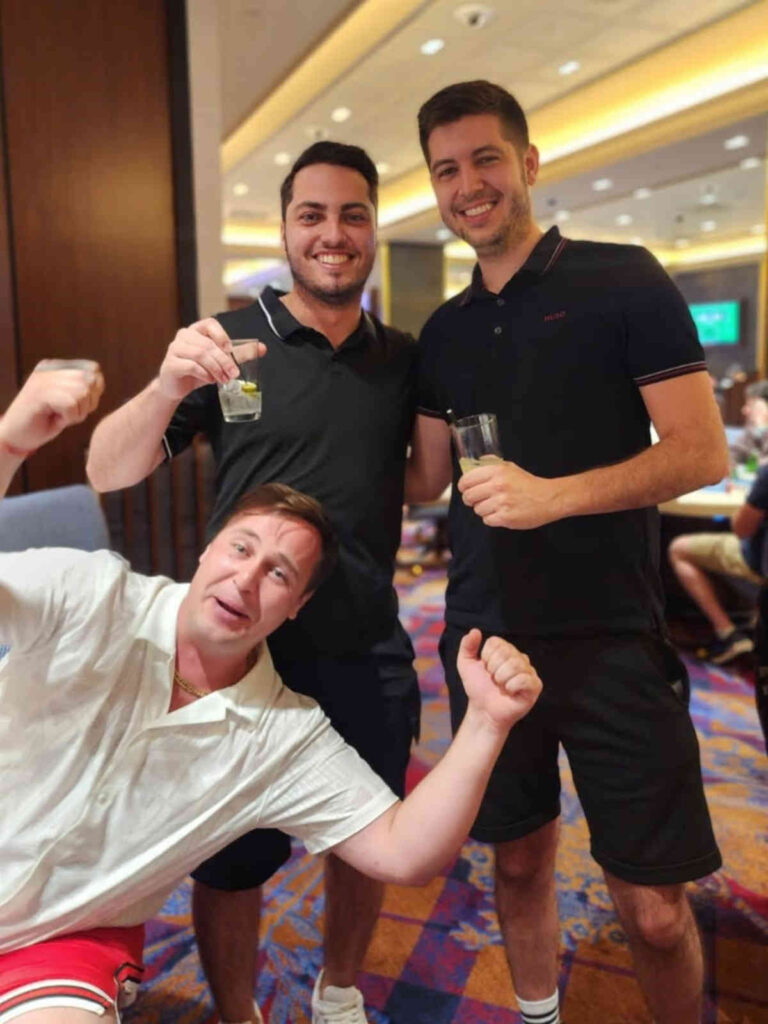
Hugo Wants to be Known for Bringing the Heat and the Fun
I want to be known as the fun action pro. I don’t want to hide the fact that poker is my livelihood — that I pay the bills with money that comes from poker.
I used to go to games and hide that I was a pro; I’d tell people I was a mortgage loan officer (which was a previous job). I wouldn’t lie, but I wouldn’t tell the full truth because I thought people wouldn’t want to play against a pro.
I’ve met so many great tourists in Vegas who upon learning that I am a pro – while also seeing me be a nice, sociable person – have continued to love playing with me.
I try to cater to the recreational player. Whoever is there for a fun time — I recognize that poker is built off people joining the game. If someone isn’t having fun and they’re losing money, why would they come back?
I see regulars and pros not really get that part — they’re just there for every single cent they can make in the shortest amount of time. You miss out on long-term value, connections, friendships, and getting into other games.
I can comfortably walk into the Aria and play PLO; yet, if I was someone else in a hoodie with headphones on, it wouldn’t work. That’s what my generation of poker players lacks.
I watched the old generation of personalities — love them or hate them, they were themselves, and that’s what got us to watch. They weren’t robots.
Why would we try to turn this game into a quiet library? A poker room should be loud, with laughs and drinks. If you’re not there to gamble, what are you doing?
That doesn’t mean you’re going to win every time — you have to learn how to lose in order to learn how to win. I do become a bit of a bully sometimes, especially to the Euros that don’t tip. Sorry, not sorry, for that.
But if the Euros are cool, they’re the best. Just be sure to tip and put the straddle on. No one likes a dead table with no table talk.
A Gambler at Heart, Hugo Makes Prop Bets
Right now, I have a prop bet with Texas Mike: I can’t play any craps, roulette, or blackjack, or I owe him $5k. The bet runs March 3 to August 3. He wanted me to do two years, but I negotiated it down to five months.
He was being a big bro. I got hooked on craps this year — in January I started playing for $300, ran it up to $5k in my first session, and got hooked.
In one month’s time, he was up $27k, but gave back $17k and quit while up 10k on the year degening. In February, I’d go to play poker and would play an hour, but then I’d go to play craps. I knew I needed to stop.
Luckily, Texas Mike was at Aria and we became friends — he’s a very generous guy with his time and money. Just him doing that prop bet has saved me so much money. You’ve got to quit while you’re up on gambling, which is rare. That’s my biggest prop bet ever.
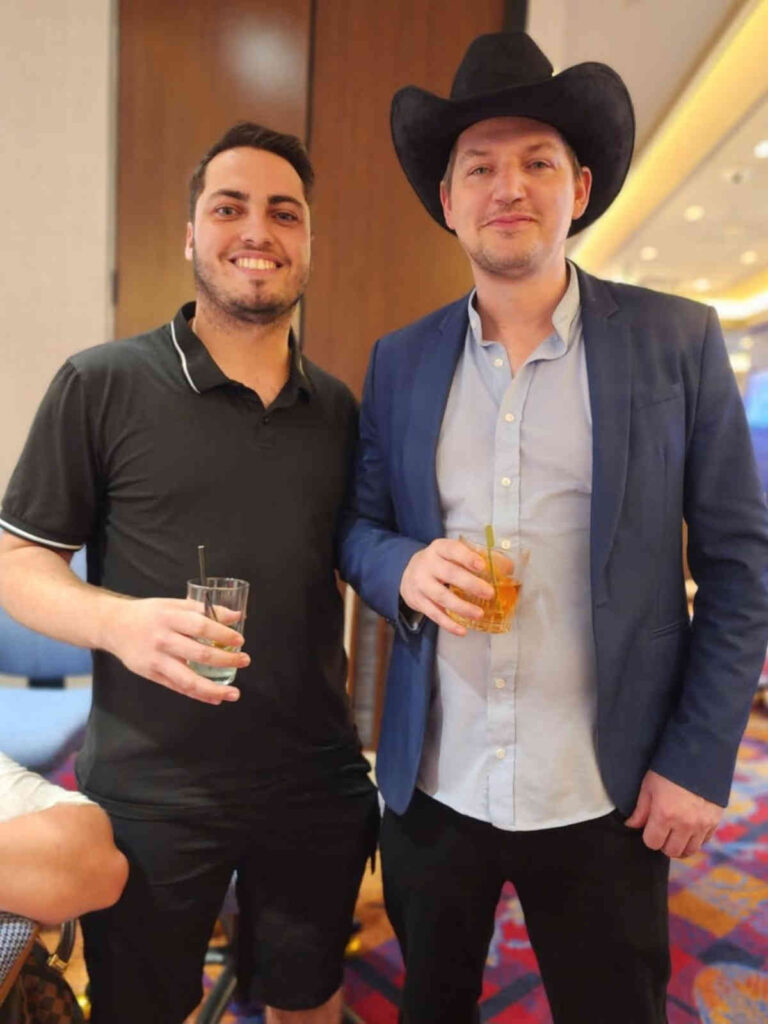
The Ambassador of Fun
Despite his success, Hugo isn’t obsessed with solvers or GTO charts.
I’ve never touched a solver. My edge is creating fun games and making sure everyone’s having a good time. If you walk into a room with that attitude, you’re going to have a good night.
His biggest strength? Mental game and bankroll management. His biggest weakness?
Honestly, sometimes it’s still the guy in the mirror. The beauty of poker is that the biggest competition is with ourselves.
Hugo Silva’s story is a testament to resilience, passion, and growth. After ten years of lessons, setbacks, and triumphs, he’s emerged not just as a player to watch, but as poker’s unofficial Ambassador of Fun.
Joey Ingram is one of my poker heroes, and I want to follow in his steps of being a crusher and an ambassador of the game. I’m blessed,” Hugo says with a grin. “I’m living the damn dream.
